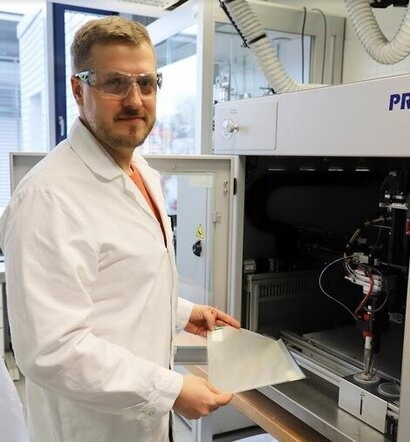
To produce cost-effective green hydrogen, industry and energy companies need efficient electrolysers on a large scale. Technologies such as pressurised alkaline or high-temperature electrolysis are already being installed in industrial environments. Another approach that shows great promise is the anion exchange membrane (AEM) technology.
AEM electrolysis combines the respective technical advantages of polymer exchange membrane electrolysis (PEM) and alkaline electrolysis (AEL). High power density, flexibility and high gas purity are qualities that AEM technology has in common with PEM technology. In addition, AEM technology is characterised by its cheap and non-critical materials – similar to AEL technology. Thus, AEM electrolysis has the potential to set new standards in the electrolysis market regarding both operating and investment costs.
Electrolysis company Sunfire now also aims to validate these advantages within the ‘Integrate’ project. Together with the research institute Fraunhofer IFAM and the Canadian partners Ionomr Innovations, The National Research Council of Canada (NRC), the Simon Fraser University and the University of Alberta, the company is collaborating to develop an AEM electrolyser in the upper double-digit kW range and to validate its technical feasibility under industrially relevant conditions for further scale-up.
At its Dresden site, Sunfire will provide a test stand with an electrolysis cell to measure the AEM stack’s performance.
“With the 'Integrate' project, we are demonstrating our innovative strength and pioneering role in the globally growing electrolysis market” said Sunfire CTO Christian von Olshausen. “We are proud to partner with high-calibre technology and research partners and to strengthen our German Canadian collaboration.”
Both Sunfire and Fraunhofer IFAM have many years of expertise in the field of electrolysis. While Sunfire as an electrolyser manufacturer has its main competence in electrolysis technologies and system integration, Fraunhofer IFAM as a non-university institution focuses on applied research and the development and qualification of materials for alkaline stacks.
In the ‘Integrate’ project, the institute designs and optimises long-term stable, high-performance non-platinum groups of metal catalysts for use in dilute alkaline environments. In addition, porous transport layers (PTL) are optimised. Once promising catalysts and a PTL have been identified, Fraunhofer IFAM will produce electrodes that will be tested at Sunfire’s industrial test environment. Based on the results, the test rig will be modified accordingly to be operational for long-term AEM operation.
“The production process at Fraunhofer IFAM will provide valuable experience in handling electrodes of the required size, so that no process has to be developed from scratch for upscaling on an industrial scale” said Clemens Kubeil, Research Assistant in the Hydrogen Technology Department responsible for the project at the institute.
Since October 1, 2022, the project has been funded by the German Federal Ministry of Education and Research (BMBF) for three years.
With its efficient high-temperature electrolysis, Sunfire has already contributed to the breakthrough of a promising and innovative technology. While the technical development was still in its early stages when the company was founded in 2010, Sunfire is now implementing it on a multi-megawatt scale in industry. In addition, the company successfully supplies numerous customers with its robust pressurised alkaline technology to meet the immense demand for green hydrogen.
Fraunhofer IFAM has been involved in the development and testing of novel materials for almost 30 years, based on sintered metal powders and coated cellular metal structures, as well as the development of the corresponding manufacturing technologies. For hydrogen-related technologies, considerable efforts have been made to develop new materials for hydrogen production using AELs and AEMELs. The institute has already been able to apply its many years of expertise in several national and international projects focusing on functional materials and prototype testing in advanced energy materials for AEL and AEMEL.
For additional information:

